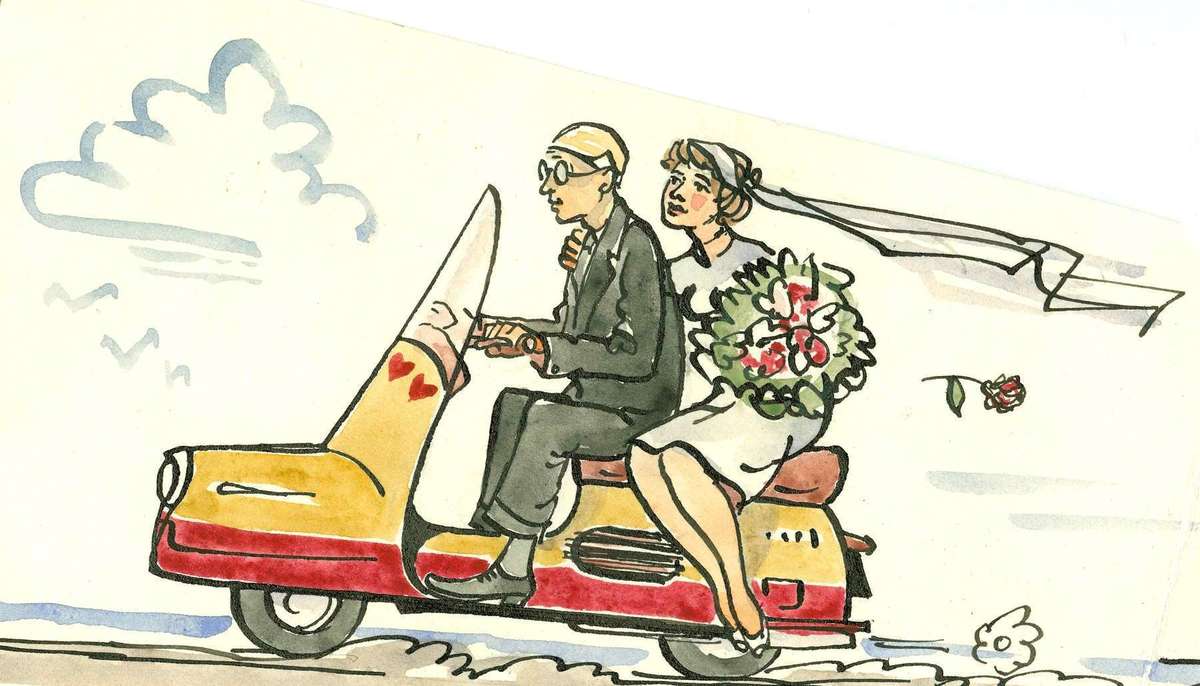David Foster Wallace, who “twice failed to pass the Rite of Christian Initiation for Adults” and took his own life in 2008, would seem a dubious source for insights into problems besetting marriage. The capacious fictionist was racked by intractable mental sickness. And yet, this literary “anti-rebel” was bent on assuming “the childish gall actually to endorse and instantiate single-entendre principles” and treating “plain old untrendy human troubles and emotions in U.S. life with reverence and conviction.” Wallace was wary of the “weary cynicism” so common in contemporary America, condemning it as a cheap mask worn to evade the “last true terrible sin” of our times: capitulation to unsophisticated naiveties. Marriage is an outstanding candidate for the dustbin of unsophistication. Consider the desperation with which traditional marriage is satirized as a slavish practice suitable for patriarchal Neanderthals or worse. The author of Infinite Jest bids us to wonder. Maybe the relentless ironies marshalled to mock marriage in the mode of “hip cynical transcendence” are actually piqued by “fear of being really human,” since being human, he insists, is to be weak and dependent in ways that our cult of contractual, individual selves is loath to confess.
Beyond the concupiscence that convinced Cain to kill Abel, the causes of this catastrophic cult of the self are several. As Tocqueville tells us, the spirit of democracy “breaks the chains and frees each link,” erasing our ancestries “isolating [us] even from our contemporaries. Each man is forever thrown back upon himself alone and there is a danger that he may be shut up in the solitude of his own heart.” Liberalism and radical individualism have always been friends, but, as Patrick Deneen points out, we must not discount the role played by capitalism (“both liberalism’s handmaiden and its engine”) in the displacement of bonds subjected to its logic. G.K. Chesterton argues in “The Superstition of Divorce,” “Capitalism, of course, is at war with the family”:
It desires its victims to be individuals, or (in other words) to be atoms. For the word atom, in its clearest meaning (which is none too clear) might be translated as "individual." If there be any bond, if there be any brotherhood, if there be any class loyalty or domestic discipline . . . these individualists will redistribute it in the form of individuals; or in other words smash it to atoms.
In fiction Wallace made such atomization a consistent concern. In Oblivion, the abstracted office environs of late capitalism promise meaningful “creative” work in part as a surrogate for other loyalties and higher ends. Take Terry Schmidt, the fraught Focus Group facilitator of the story “Mister Squishy.” Terry is supposed to be bestowing sophisticated praise upon Mister Squishy’s newest product—Felonies!®. This impossibly chocolaty snack cake is meant to “parody the modern health-conscious consumer’s sense of vice/indulgence/transgression vis a vis the consumption of a high-calorie corporate snack,” and the Focus Group’s task is to test how tantalizing the treat truly is. Schmidt despairs over his “smallness within a grinding professional machine you can’t believe you once had the temerity to think you could help change.”
The degree of despondency Schmidt suffers suggests that he has made his work into a kind of “calling,” the emergence of which Max Weber traces in The Protestant Ethic and the Spirit of Capitalism. “The calling,” he contends, is “a religious conception, that of a task set by God.” Weber locates this concept’s origins in the Reformation and its correlation with the rise of capitalism. According to the calling, “the fulfilment of duty in worldly affairs" is "the highest form which the moral activity of the individual could assume.” Consequently, everyday “worldly” work was given “a religious significance.” In truth, though, this theological handmaid of capitalism projects onto work a level of spiritual meaning that we cannot obtain, veiling the limitations of our jobs behind a religious fabrication.
Yes, Christianity’s influence over the West has weakened, but this theory of the calling has persisted, albeit in a manner morphed by the therapeutic turn mapped by Philip Rieff, Christopher Lasch, and Elisabeth Lasch-Quinn. As Lasch says in The Culture of Narcissism, the contemporary American search for self-expressive lives extends into the workplace, where we seek satisfactions in the name of a “mental health,” which, Lasch quips, is the “modern equivalent of salvation.” Schmidt, who started out with all the zeal of one called (to change the world and achieve healthy actualization), is tempered by the dehumanizing grind he goes through to win his daily bread.
Work cannot in practice realize ideals that originate in religion. We cannot equivocate our vocations and our professions. In part because of this, Schmidt yearns for ends far more natural and—Catholic. Midway through the story, Wallace substantiates his fascination with the Church when the lure of Catholic marriage descends unbidden to the mind of Terry Schmidt. Atomized to a dangerous degree, he has not lost all attractions to former, deeper bonds. In “total subjective private” he entertains sexual fantasies with Darlene, his married co-worker. Dazed by his secret fears and prospective failures, his impotence and “terrible and thoroughgoing smallness,” Schmidt has a vision of the conference room constituents as icebergs, only their caps showing, unknown and not knowable, “and he imagined that it was probably only in marriage (and a good marriage, not the decorous dance of loneliness he’d watched his mother and father do for seventeen years but rather true conjugal intimacy)” that the private worries and unseen moles, yellow toenails and dependent souls, could be truly known.
Wallace divorces himself from the tired novelistic trope of “the affair”; instead, and incredibly, he hints that in a self-made world marked by suicidal loneliness, Catholic marriage emerges as a sacrament for which there is no surrogate. For Schmidt, only the sturdiest specifications will stand a chance at assuaging the “childish heartbreak” felt when, having achieved success in the workplace, he finds himself radically incomplete. He seeks “not just a ceremony and financial merger but a true communion of souls.” Seeing this, Schmidt begins to grasp why the Catholic Church, all throughout his childhood and Confirmation, called it “the Holy Sacrament of Marriage.” For a man who pleasures himself before sleeping alone, who is desperate on account of failing to make the “high-voltage” “difference” he thought he might at work, such a marriage seems nothing short of miraculous. But the “miraculous” character makes it, to his mind, not merely unnatural but symbolic and supernatural. In a word—impossible. Schmidt mingles a scintillating celebration of marriage with a devastating downturn:
As remote from the possibilities of actual lived life as the crucifixion and resurrection and transubstantiation . . . which is to say it appeared not as a goal to expect ever to really reach or achieve but as a kind of navigational star, as in the sky, something high and untouchable and miraculously beautiful in the sort of distant way that reminded you always of how ordinary and unbeautiful and incapable of miracles you your own self were.
Though Schmidt was raised Catholic, his parents did little more than a “decorous dance of loneliness”; the Holy Sacrament of Matrimony was never modeled, known, and so he locates it in the stars. Like so many, he yearns for marriage but does not consummate in large part because he lacks compelling exemplars who would make it a sacrament instead of a symbol, a visible sign of the unseen instead of an astronomic image of the untouchable. If marriage becomes a mere symbol it will not endure. To quote Flannery O’Connor: “Well, if it’s a symbol, to hell with it.” Marriage’s survival depends on its incarnate practicality, a practicality that is hard to assume if one has never been an apprentice. Oddly, the constellation of marriage still maintains a navigational pull for Schmidt; it remains a measure of relationships. Unlike many of his peers, he does not demystify the institution in favor of self-assertion helped by wholesale capitulation to passing pleasures.
In his Spirit of the Liturgy, Joseph Ratzinger asks: “Are we not interested in the cosmos anymore? Are we today hopelessly huddled in our own little circle?” Schmidt, overcome by what he considers the faraway character of Catholic marriage, retreats. The stellar mysteries of marriage: these are too great for such a small man, a soul who has stopped going out at night, has ceased to stare at the celestial bodies, and has shut it all out with lightproof curtains. The scene is creepy but executed to solicit our sympathies. All alone, he stares anxiously at the telephone, most nights, waiting for the courage to call Darlene.
After meditating on marital realities, he finds himself seeking from her not sex but an open heart. It is as though, given the fact that she is married, she—unlike so many others—has the virtues necessary to know another without flinching and turning away. But he does not call. He says his prayers and imitates the iniquities of Onan in pathetic perpetuation of his loneliness. In Wallace’s hands, Schmidt’s sterility is tied to his work is tied to his eventual murderousness through a marriage of poison and pleasure. Measuring the poison he plans to inject into Felonies!®, Schmidt uses a scale weighed down with “low-value coins combined and tied in an ordinary Trojan condom.” Jeffrey Severs reads these condom-coin metaphors as reflecting, “the subversion of civic responsibility’s (and flowing liberty’s) language throughout: an ad focus group treated as jury duty, for instance, with ‘voir dire’ procedure.”
Freed from the obligations of the marital state, Schmidt knows no liberty. Still, if he succumbs to such petty titillation as masturbation, he nonetheless shuns the impoverished state of marriage. He yearns for that small, good thing—two dependent creatures carrying one another and others (often badly, always imperfectly) through this valley of tears. No alliance signed by two independent individuals will do. Having someone to care for in sickness and in health; being someone to be cared for till death: unable to approximate these old-fashioned, “single-entendre” ends, Schmidt descends into one of the story’s saddest and most disturbing moments.
During his morning shaves, Schmidt has taken to calling his mirrored self Mister Squishy, an appellation that escapes his lips against his will. Despite his attempts to resist, “the large subsidiary’s name and logo had become the dark part of him’s latest taunt, so that when he thought of himself now it was as something he called Mister Squishy, and his own face and the plump icon’s wholly innocuous face tended to blend in his mind into one face,” a design that one could assign some petty use but which “could never love or hate or ever care or truly know.”
Although the unalloyed logo (a “childlike cartoon face of indeterminate ethnicity”) possesses a facial affect that almost forces the onlooker to smile with satisfaction, when Schmidt mingles it with his own face he sours. Wallace’s image does not sugar the icon’s awful truth. Men who yearn for marriage but are consumed by the competing demands of work are innately dissatisfied: cut off from the daily demands, the “domestic discipline,” the saving need to sacrifice for family, their identification with work becomes overwhelming. The atomized “self” is an extraordinarily powerful invention, and it frees us from inherited obligations and forms, institutions and norms. But there is always a catch. The self, if sometimes experienced as expansive and massive, is intrinsically small.
“What is love?” asks Nietzsche’s Last Man: “What is creation? What is longing? What is a star?' thus asks the last man, and blinks. The earth has become small, and on it hops the last man, who makes everything small . . . One still loves one's neighbor and rubs against him, for one needs warmth.” Notice the dynamic at play: the last man, who makes everything small, blinks at the biggest things, but his pusillanimous state does not leave him unsettled. Schmidt, on the contrary, recognizes and balks at his own smallness—he has eyes for the sacred and yearns to be transcended but does not know how; gazing at the distant dots of the cosmos and even using them as guides, he instantiates one of the riddling problems of our age: marriage remains a lodestar for many, but exemplary (if flawed) marriages—which mix sacramental mysteries with utter practicalities—are declining with terrible speed, a phenomenon exacerbated by an excessive identification of self and work.
David Foster Wallace’s story smokes our minds with the mushrooming loneliness of his atomic protagonist. Schmidt’s “self” has lost and has been remade in the image of his abstracted and sophistic workplace. Chesterton was fundamentally worried that capitalism’s logic would wear away at the deep roots of the family. In “Mister Squishy,” we watch not the atoms being smashed, but the progeny of this fission, circling his job in an earthbound orbit, unable to bond, bouncing off the walls of his condo. A conscientious employee, exemplary even. A smashed man, sickly squishy, hard to digest.


